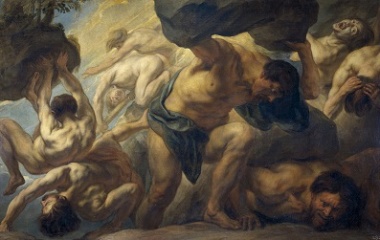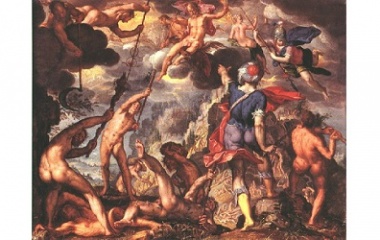Why is tyranny seemingly unstoppable? How does it become an infinite cycle of evil retribution with such ease? The pattern seems impossible to break, and when the despots are gods that rule both above and below, the fallout is vicious, powerful, and boundless!
What is Titanomachy?
In Greek mythology, Titanomachy was a 10-year battle between the older Titan and the younger Olympians gods. The prosaic old generation gap appeared to be the source of the Titanomachy conflict, with the Titans not wanting to relinquish their limitless power to the youngsters.
Source
A poem entitled Titanomachy, possibly written by a famous bard, Eumelus of Corinth, detailed the Titanomachy battle between the Titans and Olympians, but the work was unfortunately lost! Hesiod’s Theogony, composed in 700 BC, depicts the god’s battle of succession as well as another account of the Titanomachy clash by Apollodorus, a mythographer, in the 1st or 2nd century AD.
Timeline of the Epic Battle
The Start
The story of the Titanomachy starts at the time when Uranus (god of the sky) ruled the universe with Gaea (god of the Earth). They were primeval gods: the first gods and goddesses born out of the primordial Chaos. Uranus and Gaea had 12 children. Their offspring grew into towering giants, however, and soon Uranus became scared of his own children! He feared his giant children, the Titans, would be able to overpower him. Uranus could not bear the thought of losing his supreme power, and there began the tyranny that eventually led to the epic battle of Titanomachy. Uranus threw all his children into the dark depths of Tartarus, a torturous dungeon below Hades! Gaea was enraged by her husband’s harsh actions towards her children, resulting in a dangerous rift between husband and wife. Gaea was determined to get revenge on her tyrannous husband.
And she certainly did so, and with equal malice, aided by a giant sickle. Gaea persuaded her youngest son, Cronus, to castrate his father when he next came to engage in sexual relations with her. The brave Cronus successfully ambushed his father, cut off his genitalia and threw them into the sea. Uranus’ blood dripped on the ground where it bore three children: Gigantes, Erinyes, and Meliae; and from the sea, the goddess Aphrodite was born.
The Tyranny Continues
Uranus cursed his son and prophesized that Cronus’ own sons would overthrow him too. And so the cycle of fear, greed and tyranny continued. Each Titan male, including Cronus, joined with their sister to produce offspring. When Cronus and his wife, Rhea, began to procreate, Cronus’ fear of his father’s prophecy was triggered, making him paranoid of losing his own power and essentially turning him into his father, a tyrant. He banished his brothers back to Tartarus and then ate his own children. Since the children were immortal, however, they were not killed.
When Rhea gave birth to her last child, Zeus, she did not want him to suffer the same fate as her other children had and she managed to save him through trickery. Cronus wanted to eat Zeus too when he was born, but Rhea quickly substituted the child with a rock wrapped in a blanket. Cronus fell for the trick and ate the rock he thought was his child. Meanwhile, Rhea hid Zeus in a cave where, it was said, he was raised by a goat, Amalthea. There, Zeus allegedly grew from an infant to adulthood in the period of only one year! Zeus later became his father’s cupbearer, unbeknownst to Cronus.
Much like Gaea, Rhea would not accept the wretched fate bestowed on her children and convinced Zeus to overthrow his father. Zeus and his first wife, Metis, concocted a mixture of mustard and wine for Cronus to drink. The brew made Cronus vomit up Rhea’s other children. Zeus gathered all his siblings together and convinced them to start a rebellion against their father. Thus the epic battle, Titanomachy, was set in motion!
In the first initial clashes of the Titanomachy, Zeus and the younger Olympian gods were defeated by the older gods. Zeus knew he needed reinforcements if they were going to win the war. He then released the Cyclopes and Hecatonchires from Tartarus in exchange for their help in fighting against Cronus. As the Titanomachy continued, Hecatonchires threw giant rocks at the Titans, and the Cyclopes forged Zeus’ iconic thunderbolts.
Will the Fighting Ever End?
The Titanomachy battle continued for 10 years, with the gods on Mount Olympus and Titans on Mount Othrys. The repercussions of the Titanomachy could even be felt on Earth, manifesting as numerous earthquakes and other natural disasters. The Olympians eventually arose as the victors of the Titanomachy and jailed all Titans in Tartarus, except Themis and Prometheus. There they were guarded by Hecatonchires. The Titanomachy was then laid to rest as Zeus then divided the world into three parts. He became the king of the sky and ruler of mortals and gods; Poseidon, ruler of the sea; and Hades ruler of the underworld.
The Titanomachy may have reached its conclusion, but peace did not last long in the realm of narcissistic despots. Gaea was then vexed by the defeat of her children, the Titans. She created a vicious monster, Typhon, a fire-breathing giant with 100 dragon heads, to punish Zeus! And so the cycle of self-righteous retribution persisted in the land of the god. The calm that had descended after the Titanomachy was gone, and Rhea once again had to take revenge!
The Greek gods may have ruled over the sky, the sea, Earth and the underworld, but was their tendency to be led by their fear and egos, as demonstrated by the story of the Titanomachy, not a weakness? A weakness which made them fallible, a character trait they shared with much lesser creatures they referred to as mere mortals?










